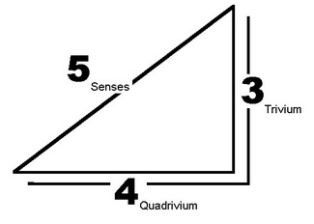The Trivium, or ‘how to learn’
Our top down system of education works something like filling up a barrel. Your head is the barrel, and your teacher’s job is to fill it up with the required material to pass the Big Test at the end of the year. How one is supposed to learn this material is never the issue. The system is such that the material is to be presented to the students, they’ll retain it or memorize it, and then they’ll get a grade over 65 and “pass”. Collect enough grades over 65 and you’ll pass the requirements, and you’ll get a diploma and be somewhat ‘educated’. Each subject is to be learned in this manner, and the higher the grade, the more you’ve learned.
This is not how learning was done for thousands of years, and with good reason. It patently ignores HOW to learn a subject. This system is a comparatively new one, and if the learned people of the past saw our school system, I think they would be shocked not necessarily at how poor it is, but at the system itself. Having information or facts thrown at you for 180 days and then regurgitating the information for a grade has shown to be ineffective. The Trivium is a method of how to learn, not what to learn. The basic idea behind it is that once one learns how to learn, he can become conversant and knowledgeable about a great many things. I wish I had been exposed to this at a much younger age. Let’s do a short overview.
The Trivium is made up of three parts: Grammar, Logic, and Rhetoric – in that order.
General Grammar – Answers the question of the Who, What, Where, and the When of a subject. Discovering and ordering facts of reality comprises basic, systematic Knowledge. General grammar is knowing what the words mean in the sentences you are reading. If the meanings are unclear to you, or vague, then you aren’t totally clear about what is being stated. Nailing down the definitions, stripping away vagueness and connotations become the path to clearly and solidly understanding the written or spoken word.
Formal Logic - Answers the Why of a subject. Developing the faculty of reason in establishing valid [i.e., non-contradictory] relationships among facts, systematic Understanding. The order of the words in a work relate in a certain way. Aristotelian logic follows a pattern, and as one reads or listens, if words are used incorrectly, or illogically, or assumptions are made, one is able so see falsehoods or sophistry (complex words used with intent to confuse) in action.
Classic Rhetoric - Provides the How of a subject. Applying knowledge and understanding expressively comprises Wisdom or, in other words, it is systematically useable knowledge and understanding. This is where one is able to share one’s wisdom with others through either the spoken word or through writing. Now you are able to see and edit your own rhetorical shortcomings, improve your production, and create a body of work that is knowledgeable and logical.
Following these three steps can enable you to become able to learn any subject you wish. Learning the vernacular of the topic, going through and improving your dexterity with the topic, then sharing it with others is a method that allows you to really learn subjects from a molecular level – from the ground up.
Knowledge –> Understanding –> Wisdom.
Many thanks go out to the work of Jan Irvin at www.triviumeducation.com
Reprinted with permission from marolla.wordpress.com

No comments:
Post a Comment